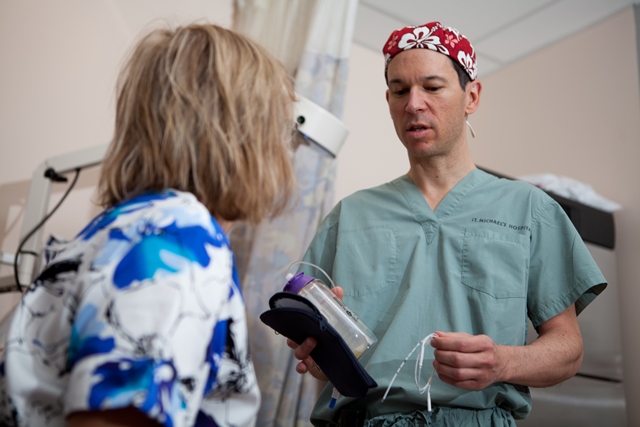Imagine being able to go home the same day as having major foot or shoulder surgery and still cope with the pain.
That’s what some patients at St. Michael’s are able to do as a result of an innovative pain management program and research study involving Dr. Brian Pollard, an anesthesiologist, and orthopedic surgeons Drs. Timothy Daniels and Jeremy Hall.
Some of their patients are going home early with a disposable pump dispensing pain medication into a catheter inserted near the site of the surgery, which they remove at home themselves after two days.
MORE: SPINE STIMULATION TINGLES PAIN AWAY
“This is making a huge difference in the patient experience,” Dr. Pollard says. There are also potential cost savings for the hospital and, by reducing the reliance on inpatient beds, more surgeries may be done.
Before surgery, Dr. Pollard, using ultrasound to guide him, inserts a catheter beneath a patient’s skin behind the knee near the sciatic nerve (for foot and ankle surgery) or near the brachial plexus network of nerve fibers in the neck (for shoulder surgery). The catheter is taped in place and connected to a disposable pump that looks like a baby bottle and goes into a belt around the patient’s waist. Inside the bottle is a balloon filled with local anesthetic.
Patients currently eligible for the Continuous Peripheral Nerve Block are those undergoing shoulder or rotator cuff surgery by Dr. Hall or foot and ankle surgery by Dr. Daniels, the head of orthopedic surgery and an international expert in foot and ankle surgery.
Dr. Pollard said the CPNB allows patients to go home to a familiar environment and routine sooner. He said there are also fewer potential side effects such as nausea, vomiting, constipation, dizziness, and confusion when minimizing oral narcotics in favor of regional anesthetics.
Sending people home early saves money – an average hospital stay costs about $1,500 to $2,000 a day vs. $150 for the pump. Many patients are kept in hospital after surgery primarily for pain management, especially orthopedic patients who can have moderate to high-intensity pain. Freeing up in-patient beds also allows surgeons to potentially perform more procedures and reduce wait times. The program has just received hospital funding for 500 pumps a year.
Toronto is known worldwide as a centre of excellence for regional anesthesia, and Dr. Pollard frequently goes to other hospitals presenting St. Michael’s pain pump program to educate clinicians and to promote this innovative patient care strategy.


